Text
My childhood crushes list because I wanna see if there is a pattern somewhere
...I don't think lots of people know him but.. Ryoga Hibiki



^^^this mother fucker right here. I used to have the fatest crush on him but I don't remember a lot about him. I do remember that I used to be both happy and upset every time he and the fl had a moment together
I also happened to have a smaller but still there crush on his arch nemesis Ranma Saotome



^^^this motherfucker right here (yes they are the same person. Search remna 1/2 {also fanart credit: https://ranmafioso.tumblr.com/post/117620083102/chaoticwildhorse-render-13-saotome-ranma } )
-------------------------------
then there is Kaito Kuroba

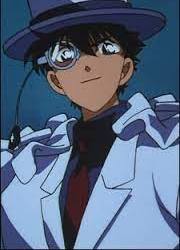

^^^ him!! I loved his magic tricks and was so damn impressed by him
I...also liked his arch nemesis...



^^^ shinichi kudo. although this time I think I liked shinichi more which is weird cause he turns to a kid...but I guess I was a kid too sooo....
anime: detective Conan
-------------
I'm not sure which part of this hair cut did I like but yeah


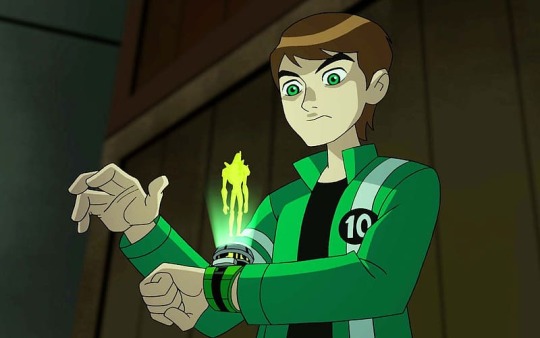
^^^ ...yeah
...him too 💀💀💀



^^^ ...yeah X2
...Ben 10 Alien Force
---------------------------------------
He was my favorite though <3
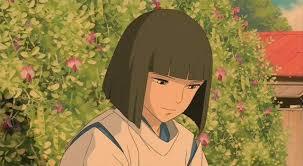
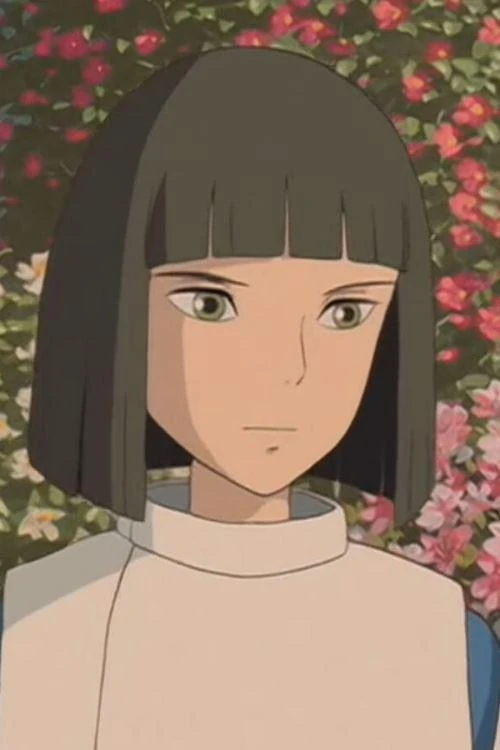

^^^ <3333
I still love him <3
------------------
I will ad more when I remember 😊
0 notes
Text
Thank you :)
50 WORDS TO USE INSTEAD OF “SAID”
Do you ever find yourself over-using the word “said” in your writing? Try using these words/phrases instead:
stated
commented
declared
spoke
responded
voiced
noted
uttered
iterated
explained
remarked
acknowledged
mentioned
announced
shouted
expressed
articulated
exclaimed
proclaimed
whispered
babbled
observed
deadpanned
joked
hinted
informed
coaxed
offered
cried
affirmed
vocalized
laughed
ordered
suggested
admitted
verbalized
indicated
confirmed
apologized
muttered
proposed
chatted
lied
rambled
talked
pointed out
blurted out
chimed in
brought up
wondered aloud
(NOTE: Keep in mind that all of these words have slightly different meanings and are associated with different emotions/scenarios.)
63K notes
·
View notes
Text
Thank you :)
Poison list
While it's important to approach writing with creativity and imagination, it's crucial to prioritize responsible and ethical storytelling. That being said, if you're looking for information on poisons for the purpose of writing fiction, it's essential to handle the subject matter with care and accuracy. Here is a list of some common poisons that you can use in your stories:
Hemlock: Hemlock is a highly poisonous plant that has been used as a poison in various works of literature. It can cause paralysis and respiratory failure.
Arsenic: Arsenic is a toxic element that has been historically used as a poison. It can be lethal in high doses and can cause symptoms such as vomiting, abdominal pain, and organ failure.
Cyanide: Cyanide is a fast-acting poison that affects the body's ability to use oxygen. It can cause rapid loss of consciousness and cardiac arrest.
Nightshade: Nightshade plants, such as Belladonna or Deadly Nightshade, contain toxic compounds that can cause hallucinations, respiratory distress, blurred vision, dizziness, an increased heart rate, and even death when ingested.
Ricin: Ricin is a potent poison derived from the castor bean plant. It can cause organ failure and has been used as a plot device in various fictional works.
Strychnine: Strychnine is a highly toxic alkaloid that affects the nervous system, leading to muscle spasms, convulsions, and respiratory failure.
Snake Venom: Various snake venoms can be used in fiction as deadly poisons. Different snake species have different types of venom, each with its own effects on the body.
Digitalis: Digitalis, derived from the foxglove plant, contains cardiac glycosides. It has been historically used to treat heart conditions, but in high doses, it can be toxic. Overdosing on digitalis can cause irregular heart rhythms, nausea, vomiting, and visual disturbances.
Lead: Lead poisoning, often resulting from the ingestion or inhalation of lead-based substances, has been a concern throughout history. Lead is a heavy metal that can affect the nervous system, leading to symptoms such as abdominal pain, cognitive impairment, anemia, and developmental issues, particularly in children.
Mercury: Mercury is a toxic heavy metal that has been used in various forms throughout history. Ingesting or inhaling mercury vapors can lead to mercury poisoning, causing symptoms like neurological impairment, kidney damage, respiratory issues, and gastrointestinal problems.
Aconite: Also known as Wolfsbane or Monkshood, aconite is a highly toxic plant. Its roots and leaves contain aconitine alkaloids, which can affect the heart and nervous system. Ingesting aconite can lead to symptoms like numbness, tingling, paralysis, cardiac arrhythmias, and respiratory failure.
Thallium: Thallium is a toxic heavy metal that can cause severe poisoning. It has been used as a poison due to its tastelessness and ability to mimic other substances. Thallium poisoning can lead to symptoms like hair loss, neurological issues, gastrointestinal disturbances, and damage to the kidneys and liver.
When incorporating poisons into your writing, it is essential to research and accurately portray the effects and symptoms associated with them. Additionally, be mindful of the potential impact your writing may have on readers and the importance of providing appropriate context and warnings if necessary.
If you want to read more posts about writing, please click here and give me a follow!

19K notes
·
View notes
Text
‘No, you can’t leave yet- our assignment isn’t over yet..- Doctor will be furious…!’
‘Darling child…that’s not how it works you know…’
‘But…’
‘It’s one of the lessons I had hoped to teach you myself sometime in the future…yet it looks I became the lesson…’
'...'
'I thought I had more time...that you were too young...yet... how...foolish, forgive...me...'
#writers on tumblr#writeblr#writing#writing prompt#writing inspiration#writer stuff#tw implied death#character death
3 notes
·
View notes
Text
perhaps helpful for someone
this is your gentle reminder to stop fighting against your adhd and instead structure your life around it
buy a pack of chapsticks and put one in the pocket of all of your coats and jackets because you always forget to bring one and chapped lips is sensory hell
leave important things where you can see them. if they go in a box or a drawer you will forget they exist
put any appointments or deadlines in your phone calendar As Soon As you get them. set a reminder for a week before, a day before, an hour before, as many as you need as often as you need them.
when that little voice in your head says "i dont need to write that down, ill remember it" that is the devil talking!!! write it down anyway!!
plan for down time. have a few hours at the end of every day to just do fun stuff like engage in your hyperfixations. even if you didnt get all of your work done that day, have the rest anyway. you probably spent the whole day beating yourself up for not doing what you Should be doing, so you still need the break.
if you never eat vegetables because its too much effort to chop and cook them, get the frozen or canned shit. it doesnt go off for ages and you just have to microwave it. theres no point buying fresh vegetables if they just keep going off and being left to rot in the bottom of your fridge
if you struggle to decide what to have for dinner every day, take the decision out of it. choose a set of meals and eat those on rotation until you get sick of them, then choose some new ones and do it again.
its not stupid if it works! our brains literally have a chemical deficiency. you are allowed to accommodate yourself. go forth and stop making your life more difficult than it has to be because "this shouldn't be this hard". it is hard, so make it easier.
92K notes
·
View notes
Text
Me:*peacefully hating on a character*
Character:*shares relatable backstory/Point of view*
Me:
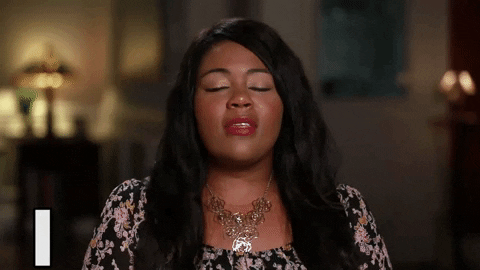
#oc#humor#yup that's it#I'm not putting a list of characters#it's always the good books/movies/games#like leave me alone#I'm not trying to acknowledge my issues
0 notes
Text
"If we're allowed to analyze why art makes us feels so much, how it can help heal us, we should also be allowed to analyze the way in which it harms us." -- An In-depth Discussion on Romanticizing Yandere
A year ago, I would have thought making a post explaining why yandere shouldn't be romanticized in fiction is completely unnecessary, as that sentiment should be common sense. However, most people who think it's ok to romanticize yandere miss a LOT of nuance in their justifications. After poring through my entire tumblr (and realizing I worded a few things poorly in the past), I've compiled my strongest arguments in this post, combined with evidence and examples. I know a lot of yandere-romanticizers refuse to look at opposing viewpoints, but putting this together was still very cathartic for me. if any of you come across someone who thinks romanticizing yandere is ok, i think linking them to this could potentially help. as always, constructive criticism is welcome :)
trigger warnings: discussion of domestic abuse/violence, murder, r/pe, p/dophilia, s/icide, purity culture, slut-shaming, victim-blaming, generally harmful and toxic stuff
[ TABLE OF CONTENTS ]
+ Common argument 1: But fiction doesn't affect reality!
+ So why do so many people romanticize abuse in fiction?
+ Common argument 2: If you want to ban all media that romanticizes abuse, you're no different from the Karen's who want to ban all violent video games!
+ Common argument 3: You're kink-shaming!
+ Comment argument 4: If people can’t differentiate between fiction and reality, that’s their problem.
+ Common argument 5: Fiction is not a place to find your morals. Authors are not responsible for teaching you what a good relationship looks like. Look at books like Lolita!
+ What about abuse victims who romanticize it as a coping mechanism?
+ If an abuse victim is unable to get support via therapy, then what?
_______________________
To clarify: I am NOT against people writing about the most dark, grotesque, horrible issues. In fact, some of my favorite books (ex. A Thousand Splendid Suns) tackle extremely dark material, from child marriage to war to domestic violence. However, I am strongly against those topics being portrayed in a romanticized or idealized manner.
imo, the worst thing about romanticizing yandere (or pedophilia, or bestiality, etc) is that you are actively disrespecting victims of abuse. I dare a yandere romanticizer to go up to a victim of said abuse and try to rationalize their fantasies to them. it's just so cruel. in addition, they are inherently perpetuating the normalization of abuse irl, which I will explain below.
i understand a lot of the people who romanticize yandere are young or kids who just don't know any better. however, that still doesnt justify romanticizing yandere. especially if it's adults doing that. when it comes to the victims themselves romanticizing abuse as a coping mechanism, I will explain my thoughts on that later in this post.
Common argument 1: But fiction doesn't affect reality!
The phrase "fiction doesn't affect reality" truly only makes sense if we're talking about something like this: No matter how wildly you wave your hands, you cannot summon a wand at your doorstep. No matter how many spiders you get bitten by, you won't turn into Spiderman.
But in the context most people use that phrase, fiction does absolutely affect reality. Not always in the most obvious, cause-and-effect way, but to act like fiction and reality operate in separate realms just isn't true. Reality affects fiction, and fiction affects reality.
EXAMPLES
One of my favorite, positive examples of fiction affecting reality is The Jungle by Upton Sinclair.
"Upton Sinclair wrote The Jungle to expose the appalling working conditions in the meat-packing industry. His description of diseased, rotten, and contaminated meat shocked the public and led to the empowering of the Department of Agriculture to impose regulations on the meat and dairy industries. Before the turn of the 20th century, a major reform movement had emerged in the United States."
Then we have a terrifying example, in which people inspired by "Death Note" literally murdered someone.
Below, we have one of the most horrific examples. The show 13 Reasons Why doesn't just discuss su/cide; it actively romanticizes it, as well as s/lf harm.
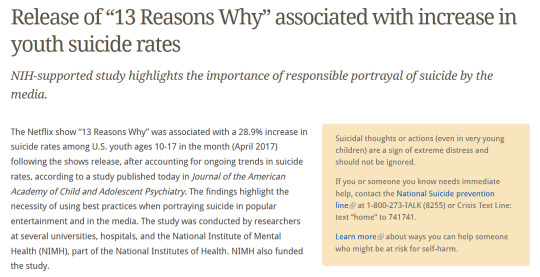
source
I'd consider all of these to be extreme cases, where the effect of media on reality was pretty obvious. However, like I mentioned before, most instances of fiction affecting reality are much more subtle and gradual.
Now, should the author of Death Note be blamed for the murder? Does this mean no one should ever write about murder or dark topics? No, that's not at all the point I'm trying to make here. In this section, I'm trying to establish that fiction does affect reality. I will explain the other nuances later.
now let's talk about reality. unfortunately, we live in a world where abuse to women, children, and others occurs every second. we live in a world where if a woman reports her husband's abuse, she isn't taken seriously. They tell her, "he's your husband, he can sleep with you whenever he wants!" They tell her, "you shouldn't be creeped out by that guy stalking you, he just wants to ask you out!" They tell her, "why are you upset? he's hot!" They tell her, "isn't it a blessing to have a man that obsessed with you? Isn't that what every woman wants?"
fiction is wonderful as it is the only situation where people have FULL control over what happens and how it happens. many abuse victims are gaslit and never receive justice, but fiction allows us to tell stories about victims who grow from their experiences, characters who are able to work through their trauma, characters who are able to gain venegeance from their trauma. fiction is a powerful tool that can show audiences, THIS is what trauma looks like. this is how trauma victims think, feel, and operate -- and it can have a similar positive impact as Sinclair's The Jungle did. trauma should never be used as a cheap, un-nuanced "shock factor" device in stories, let alone a romantic fantasy.
so why do so many people romanticize abuse in fiction?
the indented answers here are some I found in forums online, and I thought they were worth sharing.
Many, many women are taught to be ashamed of and suppress their desires, ESPECIALLY their sexual/romantic desires. If women want s/x they’ll often be accused of being a slut. Women’s accusations of s/xual assault have been outright legally undermined because those women enjoyed consensually rough s/x in the past. Women enjoying s/x is viewed by too many as gross, shallow, and even an invitation to assault them.
Think about the protagonist of 50 Shades of Gray. She’s an innocent virgin swept up by a super wealthy man who forces her to indulge in s/x that exactly matches her dreams. She never has to ask for this or face the shame of wanting it, it’s all pushed on her so she’s still totally innocent and pure while getting to enjoy a bunch of s/x and luxury. If she asked for it people would see her as a slutty gold digger, so of course she would never ask for it. And thus housewives everywhere get to enjoy k/nky fantasy without unpacking their deeply internalized shame and fear around their own desires.
I think it's a cultural thing and historically there's been a push to stay a couple despite abuses. Love conquering all type thing. There was a woman I knew growing up that was in an extremely volatile marriage but because divorce is considered far worse in the Christian circle we were in, she remained married to the guy. That was presented as brave and heroic to me growing up. A good submissive wife thing to do and the expectation was he'd eventually come around because she was so good to him (he never did). This isn't a Christian exclusive problem, more likely a general patriarchal thing, but for me and my surrounding culture, there is a long history of forced marriages and an expectation for women to stay with abusive men. So then the media will naturally reflect that and romanticize it. It's hard to undo the thinking of such cultural norms that are engrained and go back for hundreds of years. We've only progressed to the point we have now in the last 50 or so years.
I heard an argument that women who romanticize abuse in fiction can claim that they "obviously know it's not ok in real life", but part of the reason why they don't romanticize abuse in real life is because most men don't look like Christian Grey, Massimo or an anime/manhwa guy. In other words, most real abusers don't fit their fantasy of a hot guy. (This is similar to a straight guy who fetishizes lesbian relationships in p/rn. he can claim he doesn't fetishize lesbians in real life, but that can be attributed to most real lesbians not fitting that man's fantasy standards: skinny, white, feminine, young, with surgical augmentations, etc.) But in cases where a real abuser or murderer is attractive… oh boy, people absolutely romanticize them. I mean, take a look at the Ted Bundy and Jeffrey Dahmer stans. If an abuser is hot, all of a sudden, many of those fictional abuse-romanticizers don't just stick to fiction.
these are definitely reasons many women romanticize abuse in fiction. however, the fact that these behaviors are often rooted in slut-shaming, victim-blaming, purity culture, etc, still means my point stands. these are not good or valid reasons to romanticize abuse in fiction.
If we lived in a world where everyone's abuse reports were taken seriously, where no victim-blaming ever occurred, where no abuse ever happened to begin with -- then sure, write about abuse in whatever way you please. in that world, no piece of writing could perpetuate harmful ideologies nor disrespect victims, because there would be none of that occurring in reality to begin with. but we don't live in that world.
here's one last example I want to highlight in this section: Colleen Hoover. this example showcases how authors who glorify abuse in their writing can definitely perpetuate those same ideas irl.
Most Colleen Hoover novels contain sexual encounters that are not always consensual. In her most popular novel, It Ends With Us, the main character consistently chalks up her partner’s behavior as simply, “he’s just troubled, but he loves me”. A variety of these “romantic” novels by Hoover include instances of abuse and perpetuate the idea that an aggressive and controlling partner is what women need to feel wanted and adored. In another popular novel written by Hoover, November 9, there are various scenes where the male narrator talks about how he has wanted to “beat down” a woman in the past, but nothing like what he wants to do to one particular woman because she’s on a date with another guy. Worse, this man is portrayed as the “hero” of the story. It’s sickening to see that Hoover’s ideal “romance” is a man chasing down a woman that he’s not “done with”, cornering her, forcing his hands up her skirt, and forcibly grabbing onto her to hold her in place by her neck.
source
but colleen hoover's doesn't support any of that irl, right? wrong.
Aside from her problematic stories, Colleen Hoover was recently called out on social media for blocking a minor after they reached out to Hoover via Instagram DMs with information regarding her adult son sexually harassing them on Snapchat. In a Twitter thread that can be found here, you can read their experience and more about why Colleen Hoover is not deserving of the hype and praise for her writing, but rather notorious for romanticizing and sexualizing abusive behaviors.
a comment on CH's work that summarizes the issue:
I’ll pick up the most deranged dark romance titles and happily read disgusting, horrible things. Because they are TREATED like horrible things. We are aware this is vile behavior. There are trigger warnings. CoHo’s work is the literal opposite. You pick up one of her books expecting something romantic just to get hit with a right hook of romanticizing and normalizing toxic, abusive behavior.
Common argument 2: If you want to ban all media that romanticizes abuse, you're no different from the Karens who want to ban all violent video games, or the Puritans who want to ban all kinds of s*xual content!
First of all, im not trying to ban anything or anyone -- yes, I am STRONGLY against the romanticization of abuse (irl and in fiction), but writing is just a hobby for me. i do not have the time, energy, or finances to make this a full-fledged movement. I post my opinions to my personal platforms, and that's pretty much it. I don't go out of my way to seek abuse-romanticizing fics and spam hate comments on them.
More importantly, condemning the romanticization of abuse and condemning the portrayal of any violence are NOT at all comparable.
There are two questions we should ask ourselves when it comes to media (i.e. video games) with sensitive topics.
1) Does the media itself glorify or idealize the topic? Is it okay to glorify it in the context of the media?
2) How is the topic handled in the real world? Do people commonly diminish the harms of said topic irl?
Let's take an example of a violent video game. The first one that pops into my head is zombie-killing games, like Resident Evil.
Fitting the above questions in the context of zombie games:
1) Does the video game itself glorify or idealize violence towards zombies? Is it okay to glorify violence in the context of the game?
2) How is violence towards zombies handled in the real world? Do people commonly diminish the harms of zombie violence irl?
Shooting zombies is already very removed from reality. But even if zombies do become real, people will actually HAVE to shoot those zombies for their own safety. In other words, even if the game undeniably glorified violence towards zombies, there's not much inherently wrong with that. It's almost obligatory to fight off whatever is going to kill you, especially if it lacks sentience. Similarly, with most violent video games, it's about survival, not pure sadism.
However, yes, there are violent video games where the killing doesn't have to do with survival. For example, the Friday the 13th video game. You have the option to play as Jason Vorhees and kill all the camp counselors in extremely gruesome ways. Still, many people believe this game does not glorify violence; all the counselors react to the violence in a horrified way, as anyone would irl. Additionally, Jason Vorhees is undeniably the bad guy in the game (and the movies), so his actions are not idealized or romanticized. Had Jason Vorhees been portrayed as a good guy, then yeah, that would be an issue. If the camp counselors in the game loved the violence, that would also be an issue.
In summary: I am against violent games which portray violence as something to be desired, dismissed, or not treated as a big deal. I am NOT against violent video games where the violence is regarded in a horrifying, damaging way -- which is fortunately how most video games treat violence. I've seen many gamers cheer when they successfully kill someone as Jason in Friday the 13th, but most of them ALWAYS grimace when the gory cutscene plays. Most of them are upset and terrified when they play as a counselor and Jason kills them.
The other reason why this comparison of murderous games and romanticization of abuse doesn't work is this: in many communities (especially conservative ones), someone who is sexually assaulted and someone who is murdered are regarded in ENTIRELY different ways. yes, murder victims can still be blamed for their own murder (especially when it comes to the murder of POC and LGBT individuals), but sexual assault is universally taken FAR less seriously.
This quote had always resonated with me: "The only perfect victim is a dead one."
In other words, if a woman accuses her husband of abusing her, she will only be unanimously believed once she is dead. Such was the case with Becky Bliefnick and many other women.
Victims of domestic violence often are not taken seriously if 1) they fight back against their abuser, 2) they are confused about any details during the abuse, 3) if they are ever seen expressing even the smallest bit of happiness, and more. These are all such normal traits for any victim to have, yet these traits are constantly used as "evidence" against them. This type of victim-blaming has happened time and time again. Victims are only believed by everyone once they are dead. Once it's too late.
So if someone jokingly cheers on a serial killer in a horror movie, that is an entirely different situation from someone cheering on a r/pist or child m/lester in a movie. With serial killers, the cruelty of their crime is so blatantly recognized worldwide that people can make jokes about corny murders in movies. Things like pedophilia, r*pe, and domestic abuse are often not taken seriously until the victim is dead. (Ofc, I know an alarming amount of murder victims never receive justice. However, the way murder and abuse are regarded, especially online, is still quite different.)
To reiterate: I don't hate media that includes abuse; I hate media that glorifies abuse. I don't hate media that includes violence; I hate media that glorifies violence towards people and animals. It's really that simple.
Common argument 3: You're kink-shaming!!
It's wild to me that people think they can screech a buzz-word like “kink shaming!!!” to defend literally ANY kind of shit on the planet and shield themselves from all criticism. Sorry, that's not going to work here.
At the end of the day, I will always call out kinks that are rooted in the abuse and violence actual women and children (and others) largely face in real life. You know what’s upsetting to see? reality. r*pe, emotional/physical/financial abuse are real issues that occur in countries worldwide, so yes, it is horrible to see that written as a kink or fetish. If you think it’s ok to fetishize abuse, would you say the same thing about people who fetishize pedophilia? Incest? Do you think people have the right to consume child p*rn as long as it's anime CP?
I could not care less if someone has a piss kink or balloon fetish. No one is getting harmed by that. But if I’m a kink-shamer for understanding the larger context of domestic and sexual violence, go ahead, call me that. Y’all abuse fetishizers wanna act like you’re an oppressed group so badly, when the real victims here are people harmed by such violence.
Once again, I don't go out of my way to seek abuse-romanticizing fics and spam hate comments on them, because there's just no point in it. I am very vocal about my opinions on my platforms, and I like to inform others about this as well.
Comment argument 4: If people can’t differentiate between fiction and reality, that’s their problem. Most adults can read fiction that romanticizes yandere because they know it’s just fiction.
But that’s not the problem. The problem isn’t that people can’t tell the difference between fiction and reality. The problem is that toxic behavior is ALREADY romanticized in real life. Creating fiction where yandere/toxic behavior is seen as a good thing does nothing but contribute to this real-world phenomenon. I saw someone note online, “You can even argue that the reason we romanticize yanderes in fiction is because it is not taken seriously and glamorized in real life,” and that statement really stuck with me.
Common argument 5: Fiction is not a place to find your morals. Authors are not responsible for teaching you what a good relationship looks like! Look at books like Lolita!
Classic strawman argument. Once again, people fetishize abuse in real life, and fiction is a reflection and amplifier of that reality. No, fiction does not have to be all happiness and rainbows. Anyone can write about the darkest content imaginable. That doesn't mean it's okay to undermine/romanticize abuse, disrespecting and invalidating countless abuse victims.
it's so funny when people use Lolita as a gotcha moment because did y'all even read the book? the story literally portrays the pedo as a creepy ass gross man who purposely misinterprets everything about the little girl. it's not a cute romance book -- and even if it was, does that mean others should do the same? whack ass logic
Common argument 6: There are victims of abuse who romanticize it as a coping mechanism! How dare you shame them!
It's sad that so many abuse-fetishizers use this is a gotcha! moment. It's like when homophobes who hate Pride Month start whining about veterans. "Ummm what about the veterans??? why don't THEY get a whole month dedicated to them?"
But in reality, those homophobes don't actually care about veterans, because the ONLY time they even mention veterans is when they're justifying their homophobia. Outside of that, they don't gaf.
Similarly, the only time abuse-fetishizers will care about abuse victims is when they're justifying their own media consumption. Do those abuse-fetishizers listen to the thousands of abuse victims whom are strongly against the romanticization of abuse in fiction? Do they care about the countless victims hurt and actively harmed by the romanticization of abuse in fiction? Nope. Abuse fetishizers only acknowledge the victims who fit their worldview.
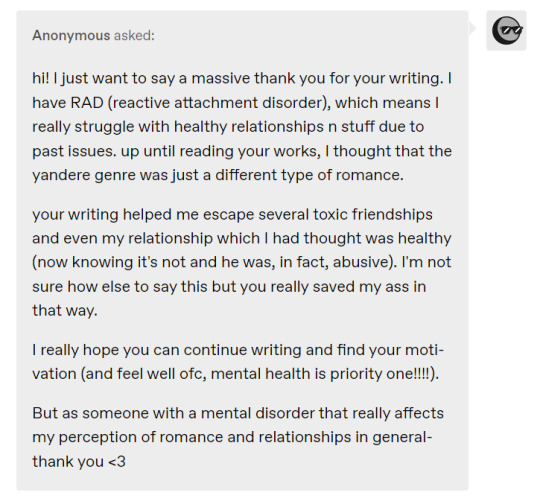
What do those abuse fetishizers have to say about readers like this? (link to original post)
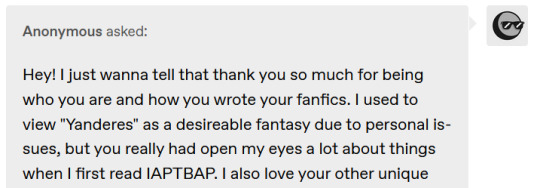
Or readers like this? (link to original post)
Stop claiming to care about victims when you pick and choose which victims to listen to.
However, I will admit - there are victims who use abuse-romanticizing fiction to cope. Those people do exist. Oftentimes, the solution presented to those victims is to seek therapy instead of consuming fiction that glorifies abuse. I have made this suggestion before on Quotev and Tumblr, but I have recently realized a flaw with this solution.
Therapy is EXPENSIVE. and it isn't this miracle solution to everything.
Not everyone can afford therapy, but even if someone can, finding the right therapist is extremely difficult. Some POC only feel comfortable with therapists who are also POC; some queer people only feel comfortable with a queer therapist, etc, and they may not find therapists with those traits within a reasonable distance. And ofc there's intersectionality to consider as well. On top of that, some patients just don't vibe with the therapists in their area, and some therapists just aren't good.
So if someone is unable to get support via therapy, then what?
Of course, there are other resources which can potentially help an abuse victim. There are domestic abuse hotlines, online support groups (many of which are anonymous), and of course, media where a character works through their own healing after abuse. Media where a character gets revenge after their abuse. Media that discusses the different facets of abuse, many of which can resonate with abuse victims without glorifying abuse.
But let's say an abuse victim can only cope by consuming abuse-glorifying fiction. let's say that's the only possible solution for them.
if an abuse victim absolutely is going to write a fanfic which heavily romanticizes yanderes, then please, they should at least keep it on their personal device -- not published online. That victim can keep their abuse-romanticizing writing as their own personal coping tool, and by not posting it online anywhere, they are preventing those ideologies from harming others: abuse victims who are incredibly disrespected by the story, abuse victims who are constantly gaslit and not taken seriously irl because others claim they "wanted it" or that it's "hot", or people who would stay in their abusive relationship (rather than seek help) if they view media romanticizing abuse. Once you put that kind of fiction out on the internet, you are actively causing harm. if you are keeping it to yourself, at the very least, you aren't harming others or perpetuating those ideas on a broader scale.
But what if an abuse victim wants to consume abuse-glorifying fiction, but they aren't a writer? What do they do?
First, please do not support writers who publish abuse-glorifying fiction. this will incentivize them to continue making such content for the public, perpetuating harm.
However, this doesn't leave you with nothing. People have been generating fanfics through ChatGPT now, and a lot of people use it to generate fanfiction they've never been able to consume before -- like fanfiction of their favorite rarepairs, fanfiction of an extremely niche piece of media, fanfiction that covers controversial or rare topics, etc. Because ChatGPT is free to use and is not an actual human, generating any kind of fiction through ChatGPT won't incentivize it to continue writing those types of stories (as far as I know). So that's probably the safest option.
final notes
authors CAN write about dark topics, I am never trying to police or "cleanse" the writing community. If you are writing for yourself and only yourself, not publishing it online anywhere, then it really is a free-for-all. write whatever you please in whatever way you want. I won't agree with your content, but how would I know it even exists? Yet the moment you hit the "publish" button, you are at least partially responsible for the content you push out onto the internet.
I still do not think writing or consuming abuse-romanticizing fiction is a healthy coping mechanism for victims of abuse. However, if someone truly has no other choice, there's a way to go about their desires that minimizes the harm on everyone else.
107 notes
·
View notes
Text
I have no idea if it shows but the header picture I used is actually from pinintrest
Link: https://www.pinterest.com/pin/1059753356049292940/
my pfp however is mine
2 notes
·
View notes